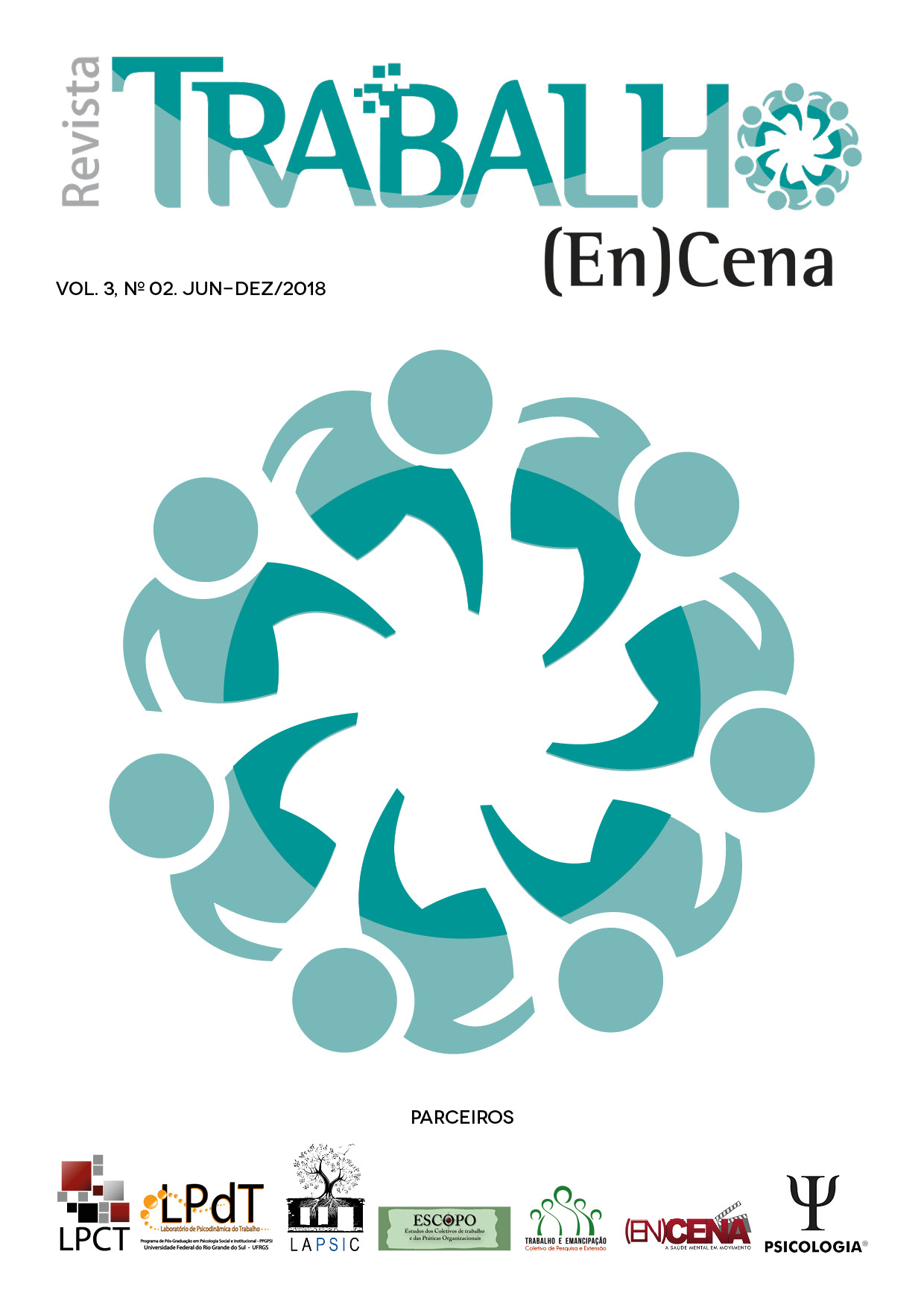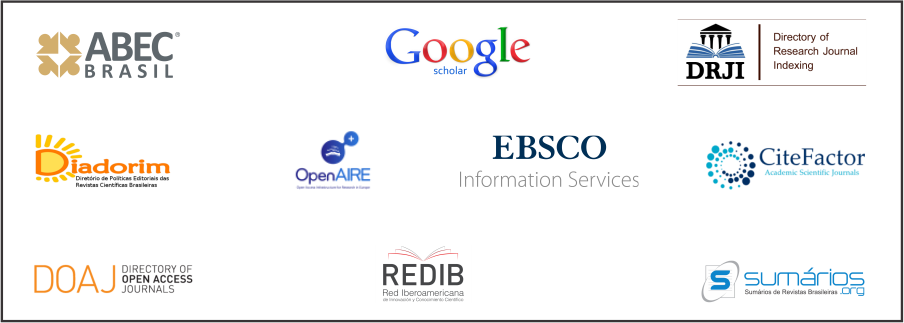La Relation Entre Le Stress Professionnel Et La Justice Organisationnelle: Un Essai
DOI :
https://doi.org/10.20873/2526-1487V3N2P34Résumé
L'étude du stress professionnel, ses sources, sa dynamique de fonctionnement et ses conséquences ont été largement étudiées. Il existe un consensus selon lequel l'environnement de travail est une source puissante de stress professionnel. En prenant la construction de la justice organisationnelle, on fait l'hypothèse qu'un lieu de travail marqué par l'injustice organisationnelle peut être un puissant facteur de stress, puisqu'il nécessite des adaptations constantes de l'individu pour faire face à de telles injustices. Ce travail propose une réflexion sur la relation entre le stress professionnel et la justice organisationnelle, donc il est conclu de la littérature qu'un environnement de travail marqué par des injustices peut être un facteur de stress potentiel et souligne l'importance de l'étude empirique de cette relation.
Références
Araújo, T. M., Aquino, E., Menezes, G., Santos, C. O., & Aguiar, L. (2003). Aspectos psicossociais do trabalho e distúrbios psíquicos entre trabalhadoras de enfermagem. Revista de Saúde Pública, 37(4), 424-433. Disponível em: http://www.revistas.usp.br/rsp/article/view/31611. Acesso em 28/12/2017.
Assmar, E. M. L., Ferreira, M. C., & Souto, S. D. O. (2005). Justiça organizacional: uma revisão crítica da literatura. Psicologia: reflexão e crítica, 18(3), 443-453. Disponível em: http://www.scielo.br/pdf/%0D/prc/v18n3/a19v18n3.pdf. Acesso em: 22/12/2017
Benzoni, P. E, Barato, C. C., Marchezin, M. A., & Inocente, M. M.. (2016) Afastamento do trabalho e crise do capital: a incapacidade refletindo o contexto. Revista Ser Social, v. 18, n. 39, p. 540-561. Disponível em http://periodicos.unb.br/index.php/SER_Social/article/view/21727/17530 Acesso em 20/09/2017.
Carr, D., & Umberson, D. (2013). The social psychology of stress, health, and coping. In Handbook of social psychology (pp. 465-487). Springer Netherlands. Disponível em: https://link.springer.com/chapter/10.1007/978-94-007-6772-0_16. Acesso em 05/01/2018.
Choi, S. M., Park, Y. S., Yoo, J. H., & Kim, G. Y. (2013). Occupational stress and physical symptoms among family medicine residents. Korean journal of family medicine, 34(1), 49-57. Disponível em: https://synapse.koreamed.org/DOIx.php?id=10.4082/kjfm.2013.34.1.49. Acesso em 05/01/2018.
Fischer, R. (2012). Organizational justice research: present perspectives and challenges. Revista Psicologia Organizações e Trabalho, 12(1), 97-112. Disponível em: http://pepsic.bvsalud.org/scielo.php?pid=S198466572012000100009&script=sci_abstract&tlng=en. Acesso em 04/01/2018.
Francis, L., & Barling, J. (2005). Organizational injustice and psychological strain. Canadian Journal of Behavioural Science/Revue canadienne des sciences du comportement, 37(4), 250-261. Disponível em: http://psycnet.apa.org/record/2005-14046-002. Acesso em 15/12/2017.
Ibrahim, M. E., & Perez, A. O. (2014). Effects of organizational justice, employee satisfaction, and gender on employees' commitment: evidence from the UAE. International Journal of Business and Management, 9(2), 45-59. Disponível em: http://www.ccsenet.org/journal/index.php/ijbm/article/view/30434. Acesso em 05/01/2018.
Karasek Jr, R. A. (1979). Job demands, job decision latitude, and mental strain: Implications for job redesign. Administrative science quarterly, Vol. 24, N. 2 285-308. Disponível em: http://www.jstor.org/stable/2392498. Acesso em 15/12/2017.
Laranjeira, C. A. (2009). O contexto organizacional e a experiência de estresse: uma perspectiva integrativa. Rev Salud Publica, 11(1), 123-33. Disponível em: https://scielosp.org/pdf/rsap/v11n1/v11n1a13.pdf. Acesso em 15/12/2017.
Leow, K. L., & Khong, K. W. (2015). Organizational commitment: The study of organizational justice and leader-member exchange (LMX) among auditors in Malaysia. International journal of business and information, 4(2), 161-198. Disponível em: http://ijbi.org/ijbi/article/view/42. Acesso em 05/01/2018.
Maissiat, G. D. S., Lautert, L., Dal Pai, D., & Tavares, J. P. (2015). Contexto de trabalho, prazer e sofrimento na atenção básica em saúde. Revista gaúcha de enfermagem. Porto Alegre. Vol. 36, n. 2 (jun. 2015), p. 42-49. Disponível em: https://www.lume.ufrgs.br/handle/10183/130175. Acesso em 04/01/2018.
McEwen, B. S., & Wingfield, J. C. (2010). What’s in a name? Integrating homeostasis, allostasis and stress. Hormones and behavior, 57(2), 1-16. Disponível em: https://www.ncbi.nlm.nih.gov/pmc/articles/PMC2815096/ Acesso em 10/01/2018.
Moon, T. W., Hur, W. M., Ko, S. H., Kim, J. W., & Yoon, S. W. (2014). Bridging corporate social responsibility and compassion at work: Relations to organizational justice and affective organizational commitment. Career Development International, 19(1), 49-72. Disponível em: http://www.emeraldinsight.com/doi/full/10.1108/CDI-05-2013-0060. Acesso em 05/01/2018.
Pio Silva, E., Minette, L. J., Souza, A. P., Alves Marçal, M., & Petean Sanches, A. L. (2013). Fatores Organizacionais e psicossociais associados ao risco de LER/DORT em operadores de máquinas de colheita florestal. Revista Árvore, 37(5), 889-895. Disponível em: http://www.redalyc.org/html/488/48829247011/. Acesso em 14/12/2017.
Rai, G. S. (2013). Impact of organizational justice on satisfaction, commitment and turnover intention: Can fair treatment by organizations make a difference in their workers’ attitudes and behaviors?. Journal of Human Sciences, 10(2), 260-284. Disponível em: https://j-humansciences.com/ojs/index.php/ijhs/article/view/2634. Acesso em 04/01/2018.
Sadir, M. A., & Lipp, M. E. N. (2009). As fontes de stress no trabalho. Revista de Psicologia da IMED, 1(1), 114-126. Disponível em: https://seer.imed.edu.br/index.php/revistapsico/article/view/16 Acesso em 15/12/2017.
Sadir, M. A., Bignotto, M. M., & Novaes Lipp, M. E. (2010). Stress e qualidade de vida: influência de algumas variáveis pessoais. Paideia, 20(45), 73-81. Disponível em: http://www.redalyc.org/html/3054/305423775010/. Acesso em 15/12/2017.
Selye, H. (1950). The physiology and pathology of exposure to stress. Acta Medical Publishers, Montreal.
Sousa, M. B. C. D., Silva, H. P. A., & Galvão-Coelho, N. L. (2015). Resposta ao estresse: I. Homeostase e teoria da alostase. Estudos de Psicologia (Natal), 20(1), 2-11. Disponível em:http://www.scielo.br/scielo.php?pid=S1413294X2015000100002&script=sci_abstract&tlng=es. Acesso em 16/12/2017.
Theorell, T., & Karasek, R. A. (1996). Current issues relating to psychosocial job strain and cardiovascular disease research. Journal of occupational health psychology, 1(1), 9-26. Disponível em: http://psycnet.apa.org/record/1996-04477-002. Acesso em 13/12/2017.
Topa, G., Moriano, J. A., & Morales, J. F. (2013). Organizational injustice: third parties' reactions to mistreatment of employee. Psicothema, 25(2), 214-221.Disponível em: http://www.redalyc.org/html/727/72726347002/. Acesso em 04/01/2018.
Tziner, A., & Sharoni, G. (2014). Organizational citizenship behavior, organizational justice, job stress, and workfamily conflict: Examination of their interrelationships with respondents from a non-Western culture. Revista de Psicología del Trabajo y de las Organizaciones, 30(1), 35-42. Disponível em: http://www.sciencedirect.com/science/article/pii/S1576596214700295. Acesso em 04/01/2018.
Wang, J., Lesage, A., Schmitz, N., & Drapeau, A. (2008). The relationship between work stress and mental disorders in men and women: findings from a population-based study. Journal of Epidemiology & Community Health, 62(1), 42-47. Disponível em: http://jech.bmj.com/content/62/1/42.short. Acesso em 04/01/2018.
Téléchargements
Publié-e
Comment citer
Numéro
Rubrique
Licence
Os direitos autorais dos artigos publicados pela Revista Trabalho EnCena permanecem propriedade dos autores, que cedem o direito de primeira publicação à revista. Os autores devem reconhecer a revista em publicações posteriores do manuscrito. O conteúdo da Revista Trabalho EnCena está sob a Licença Creative Commons de publicação em Acesso Aberto. É de responsabilidade dos autores não ter a duplicação de publicação ou tradução de artigo já publicado em outro periódico ou como capítulo de livro. A Revista Trabalho EnCena não aceita submissões que estejam tramitando em outra Revista. A Revista Trabalho EnCena exige contribuições significativas na concepção e/ou desenvolvimento da pesquisa e/ou redação do manuscrito e obrigatoriamente na revisão e aprovação da versão final. Independente da contribuição, todos os autores são igualmente responsáveis pelo artigo.






